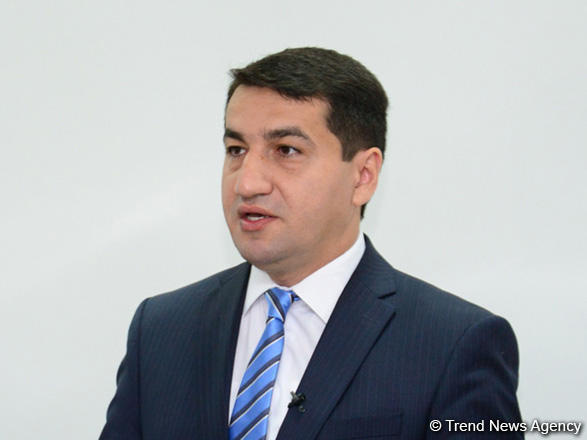Azerbaijan is always ready for constructive negotiations and contacts serving the settlement of the Armenian-Azerbaijani conflict, the Deputy Head of the Foreign Policy Department of the Azerbaijani Presidential Administration Hikmat Hajiyev told Trend.
He noted that at the CIS summit in Dushanbe, a conversation was held between Azerbaijani President Ilham Aliyev and Armenian Prime Minister Nikol Pashinyan.
The conversation started at the initiative of the Armenian Prime Minister, Hajiyev said.
"This once again shows that the format of the negotiations remains unchanged, and negotiations are conducted only between Armenia and Azerbaijan, which are parties of the conflict. Within the framework of the same format, in September, meetings between the foreign ministers of Armenia and Azerbaijan were held during the UN General Assembly in New York, and in July in Brussels. We assess this positively, and Azerbaijan is always ready for constructive negotiations and contacts serving the settlement of the Armenian-Azerbaijani conflict. This once again demonstrates Azerbaijan’s commitment to the existing format," Hajiyev said.
He also commented on the strengthening the ceasefire regime on the Armenian-Azerbaijani border and the line of contact of troops.
"The Azerbaijani side has repeatedly stated that the main reason for the ceasefire violation is the illegal presence of Armenian troops in the occupied Azerbaijani territories and the continuation of military occupation. The Armenian side has always been responsible for the ceasefire violation and the aggravation of the situation. I would like to mention the large-scale military exercises conducted by the Armenian armed forces in the occupied Azerbaijani territories after the meeting of the heads of state in November 2014 in Paris, the incitement of a well-known helicopter incident, as well as Armenian armed troops' fire by heavy guns at civilians living along the contact line in April of 2016, and intentionally aggravation of the situation," Hajiyev said.
"So, the withdrawal of Armenian troops from the occupied Azerbaijani territories in accordance with the requirements of the UN Security Council's resolutions will eliminate not only military risk, but there will also be no need for a ceasefire, and there will be comprehensive opportunities for political solution of the conflict. This will ensure peace, stability and security in the region," he added.
The conflict between the two South Caucasus countries began in 1988 when Armenia made territorial claims against Azerbaijan. As a result of the ensuing war, in 1992 Armenian armed forces occupied 20 percent of Azerbaijan, including the Nagorno-Karabakh region and seven surrounding districts.
The 1994 ceasefire agreement was followed by peace negotiations. Armenia has not yet implemented four UN Security Council resolutions on withdrawal of its armed forces from the Nagorno-Karabakh and the surrounding districts.






